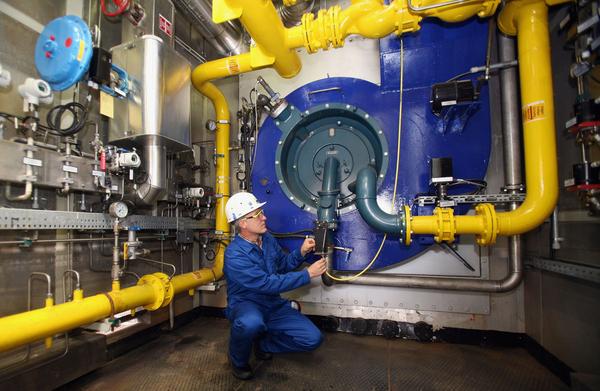The financial crisis led to losses and declining revenues. Both machine and plant engineering suffered strongly from sinking demand and lower order volumes. Meanwhile, valve makers are now seeing a light at the end of the tunnel and sentiment is getting better. Companies engaged in service and maintenance are also set to profit from the upswing. In contrast to other sectors however, service companies never really suffered a lot, even when the recession hit its low.
As a matter of fact, the maintenance and services sector was one of the few fields of businesses which profited from the financial crisis. In times of crises, companies tend to invest in the servicing of existing machines and plants, rather than expending capital on new ones. Instead of buying new valves, the old ones are maintained, repaired and overhauled.
The subjects of maintenance and testing will also be focused during workshops at the Valve World 2010 Expos and Conference, held from 30 November until 2 December at Düsseldorf fairgrounds and Congress Centre South (CCD).
Using standstills
Depending on the economic situation, production standstills offer an opportunity for maintenance services.German chemical corporation Lanxess, for instance used production downtimes in its facilities in Sarnia, Canada and Zwijndrecht, Belgium for maintenance duties. Such steps became common when the financial crisis spiked and were quite understandable.
These circumstances were also noticed by the Arca-Regler GmbH. „Some companies are buying spare parts for maintenance earlier than usual“, explains Lothar Grutesen, general manager at Arca. „Some things are becoming increasingly urgent.“
Not everyone is set to profit from the rising demand for maintenance services. Whilst companies spend money on retrofitting, repairing and maintaining their machines and plants, valve makers see their orders dwindle, as the sector has noticed.
A strong sector
Maintenance and services is gradually becoming an important business. „This sector is already one of the strongest“, claims Robert L. Bitzan, spokesperson of German services association FVI (Forum Vision Instandhaltung). He estimates the sector to be worth „at least 175 billion euro in Germany alone. “
Services companies are set to close profitable deals. Bilfinger Berger Industrial Services, for instance, received contracts from BP and other international gas and oil companies to service four different facilities in Great Britain. The five-year contracts are worth around 230 million euro. In addition, Bilfinger Berger is also Akzo Nobel’s exclusive outsourcing partner in Sweden, after signing another five-year contract. The company is supposed to keep things running smoothly with a broad servicing concept at Akzo Nobel’s facilities in Bohus, near Gothenburg, as well as in Sundsvall and Alby in the middle of Sweden. In Norway, Bilfinger Berger will service Alcoa’s aluminium plant in Mosjöe, 700 km north of Oslo, over the course of the next three years.
Hertel Total Asset Management secured a three year contract from Ineos to manage the valves in its refinery located in Grangemouth, Great Britain The Dutch company was also pleased to garner a contract from Shell, for which it will service the Stanlow refinery in Cheshire. Severn Unival, a British company, won a contract to service four North Sea platforms. The contract includes maintenance, certification, technical solutions and repairs.
Totally dismantled
Infraserv Knapsack is another company specialised in servicing all kinds of valves during downtimes at petrochemical and chemical facilities and power plants. „During downtimes, we dismantle all valves into their individual components and clean them“, explains Wilhelm Loeven from the company’s industrial maintenance unit. The results are subsequently documented. „In some cases, not all of the existing defects were dealt with.“ After examination, the valve is put together again according to the manufacturers guidelines and is controlled.
The maintenance market keeps on growing and growing. A lot of companies appreciate the numerous advantages of effective maintenance services. The service life of machines and plants is increased, their utilisation is optimised. In addition, the failure rate decreases, the availability of machines rises and operational safety increases. Maintenance services are an important value factor and help saving costs. The times when maintenance and repairs were primarily seen as a cost factor are a thing of the past.
As a term, maintenance can be used in a different sense, depending on interpretation. Reactive maintenance, for instance, does not include prevention. A repair is only made when a fault appears, or something breaks. A repair which comes surprisingly is the more expensive option.
Preventive maintenance
Preventive maintenance, in contrast, is a systematic and planned approach to service machines and facilities at specific moments. A maintenance engineer proactively services valves, before disaster strikes. This is the strategy German association Instandhaltungsforum FVI prefers, as it is the only one which allows for optimal processes. Productivity is increased by lowering the costs for conventional repairs, decreasing downtimes and warm-up times.
Nonetheless, preventive maintenance is becoming a challenge. Due to the technical requirements, processes are becoming more and more networked, complex and, to a certain degree, automated. Up-to-date concepts and systems have to be used. „In the near future, maintenance management will be supported by IT solutions and use technologies such as telediagnosis, expert systems, graphic information systems (GIS), RFID-based mobile systems, knowledge management tools and will have access to web-based catalogues to order components“, explains VFI chairman Harald Neuhaus.
Manufacturers are opting for condition-based maintenance, which requires the implementation of condition monitoring systems. Such systems monitor vibrations, torque, position and lubricants using thermography and ultrasonic sound. In addition, power and compressed air consumption are also controlled.
Sensitive check valves
Valves are a sensitive link in the production chain. Check valves, for example, can have a negative impact on process safety and operation time, if they are not carefully maintained by a professional service company. Complex analyses and the valve maker’s experience are required in order to evaluate the actual condition of these valves.
Numerous companies have created products to make sure this can happen. Flowserve, for instance, constructed a network-enabled diagnosis system for check valves, which can be integrated with a control centre, or in plant asset management via FDT/DTM. „This asset management is aimed at maintaining and servicing critical components, thereby optimising utilisation“, explains the company. Valves and positioners are constantly monitored.
Flowserve’s fully automated diagnosis system is designed not to report symptoms, but to deliver a preventive diagnosis, by focusing on the valve‘s status, instead of simply ringing an alarm. The real, underlying causes are to be made out and suggestions are given what steps will increase the service life of the valve and the entire process. Unnecessary inspections, especially the analysis of non-critical process components are avoided, unproductive steps are eliminated.
Highly qualified specialists
High-class maintenance does have its price, not only as a product. It requires well educated engineers and technicians. Today, maintenance staff is composed of highly qualified specialists, which must have detailed and interdisciplinary technical knowledge. In addition, knowledge of business administration, personnel management, customer orientated approaches and law are also required. The maintenance sector in Germany is faced with a huge challenge – there is no adequate training on the university and polytechnical level.
Maintenance can only be effective when a company is convinced of it. „Cooperation and team spirit are needed to implement modern maintenance concepts, not rivalities between single departments and thinking in lines of responsibility“, comments FVI chairman Harald Neuhaus. That is why maintenance is a topic for high-level management.
Pros and cons of outsourcing
Companies are posed with the question whether or not they should employ own maintenance personnel and equipment, or if they should outsource this area. For their part, maintenance companies are convinced there is „a trend for companies to give maintenance duties to external contractors “, says Julia Schreiber, of Voith Industrial Services. One reason may be that companies like to be flexible and do not have to provide knowledge on their own. Companies can stay focused on their core competencies.
However, the use of outsourcing is controversial. The VDI, the association of German engineers, doubts if it is sensible to hand over parts of the business process to an external contractor. This view is supported by a study of the German Fraunhofer Institut, which states outsourcing cannot be recommended in general. „Productivity is often lower, when more processes are outsourced“, explains the VDI. Productivity of companies with a high degree of vertical integration was 8 % higher than the industry average. „This means companies do not necessarily save money through outsourcing“, sums up VDI president Prof. Bruno O. Braun. Slimmer and faster does not automatically mean better. „Transaction costs with suppliers and dependencies often are issues companies do not consider enough, regardless the size of the company. “ Advantages of insourcing in contrast are lower costs due to less coordination processes, a higher degree of flexibility in bottleneck situations and dynamic control of capacities. A company can intervene swiftly, should a bottleneck occur. „A breathing structure is made possible.“ Endress+Hauser, a maker of systems for liquid analysis, relies on a high degree of insourced, vertical integration.
Process of consolidation
Maintenance companies are also experiencing eventful times. Bilfinger Berger recently acquired Austrian industrial services provider MCE and its 6.500 employees for 350 million euro. In addition, WISAG bought ThyssenKrupp Industrial Services, with a staff of 12.500 employees. The former ThyssenKrupp Service is now called „WISAG Production Service“. Voith Industrial Services was also busy acquiring companies. In the last few years it bought DIW, Hörmann and Premier. These are all signs showing the market is in a process of consolidation.
Share:







